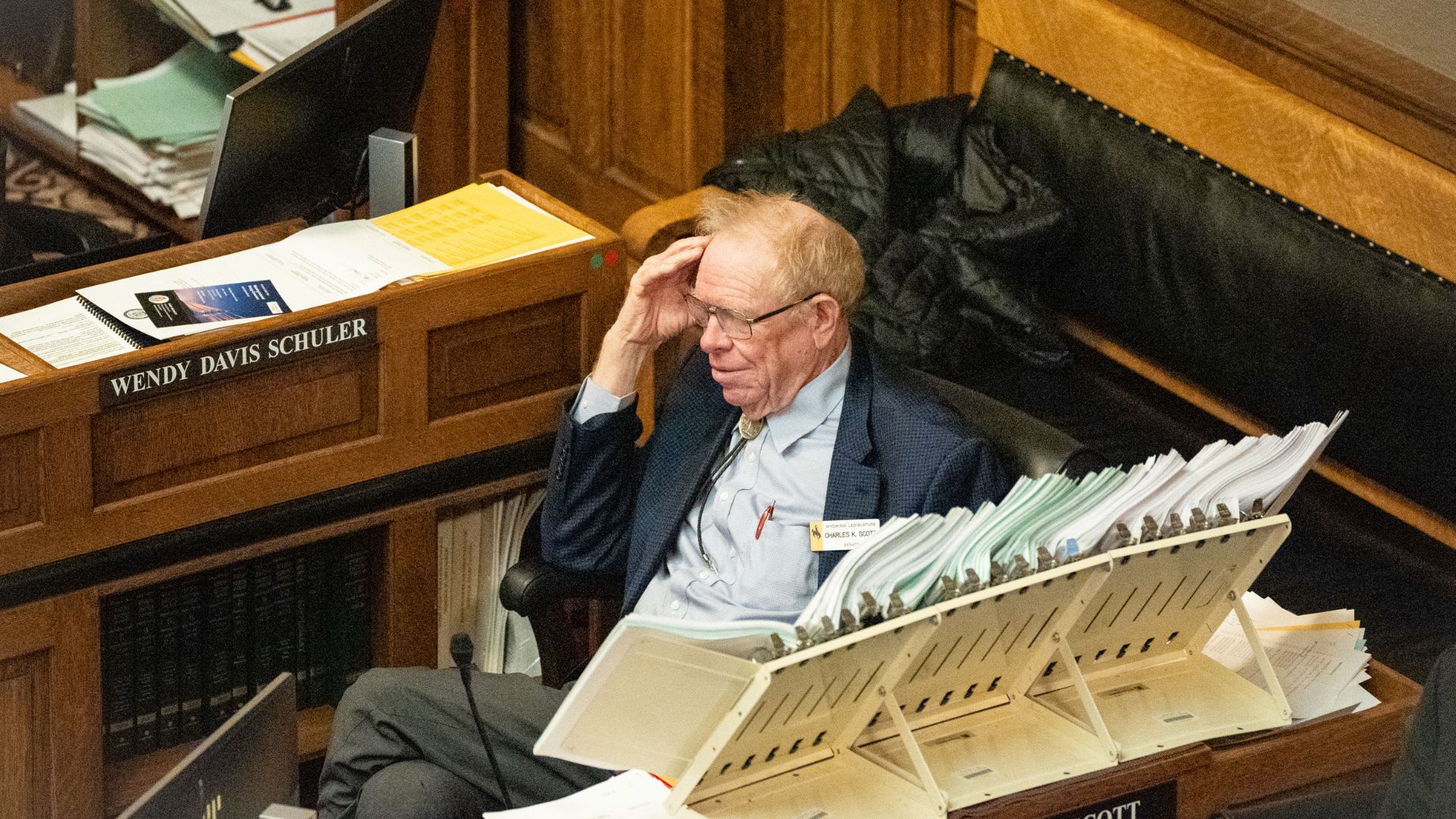Casper lawmaker pushes for more oversight of K-3 reading proficiency

Sen. Charles Scott, R-Casper — Photo by Michael Smith
CHEYENNE — It’s been nearly two and a half years since 11-year-old Paul Pine died by suicide at Carpenter Elementary School.
Paul had a learning disability that set him academically behind his fellow classmates. He struggled to read, had behavioral health issues and repeated kindergarten, at his parents’ request.
In October 2022, Paul told his parents he was having suicidal thoughts and was rushed to the emergency room at Cheyenne Regional Medical Center. A safety plan was set up for Paul that was to be followed both at home and the school. However, one day in early January 2023, Paul slipped out of music class and hung himself by his hoodie on a coat rack in the boys’ bathroom.
On Wednesday afternoon, Sen. Charles Scott, R-Casper, rubbed his forehead as Paul’s mother, Chandel Pine, retold the story of what happened to her son. Pine, with a few other Cheyenne parents, and one grandparent, urged state lawmakers during the Legislature’s Education Committee meeting in Casper to hold school districts accountable and take their children’s reading disabilities seriously.
“I’m going to put some weight on your shoulders,” Pine said. “The way our system is now is the reason my house is too quiet and my heart and my family are broken, and why we no longer have our son.”
Children with dyslexia have a higher risk of anxiety and depression, “with more negative behaviors, higher suicide rate, and increased antisocial behaviors,” according to a 2020 medical article published by the Multidisciplinary Digital Publishing Institute.
Another woman, whose grandson was diagnosed with dyslexia, dysgraphia and ADHD, told lawmakers he had reportedly told another classmate that he “wanted to kill himself.”
“It’s a mental health issue,” she said.
Before public testimony, Scott told other committee members he believed some school districts weren’t dutifully following state requirements to screen for K-3 reading comprehension.
In 2001, the state Legislature enacted the Reading Assessment and Intervention Program. This program, which has been amended a few times since its enactment, requires school districts to screen for students who are not reading at a proficient level by the third grade.
Students identified through the screening process are required to be put on an Individualized Reading Plan. Those with an Individualized Education Program, a federal education plan for children with developmental disabilities, are exempted from this requirement.
“My sense is that a good half of the (school) districts are not doing it, by simply ignoring this requirement,” Scott said.
Better training
The parents who testified Wednesday said they struggled to get school district officials to take their child’s reading disability seriously. They raised the concern that public school teachers are not trained to identify dyslexia in children.
Cheyenne parent Kari Roden taught elementary school for 12 years and had a master’s degree in literacy. But she couldn’t understand why her daughter was below proficiency in reading.
“I know how teachers feel. I know how they’re not trained,” Roden said, who is now a certified structural literacy dyslexia specialist.
After she was certified, Roden was hired by the school district to assist in the special education program. But, all the while, she fought the school district to get the learning resources her daughter needed.
One day, she got a phone call, telling her the school was dropping her daughter from the reading intervention program. Roden resigned from her position shortly after that.
“I cannot work for an institution where literacy is a privilege,” Roden said.
She told lawmakers every teacher should be trained to identify dyslexia in children, and teachers don’t need a four-year education to do so. Children who go through school unable to read carry that burden with them, which creates mental health issues, several parents said.
“I’ve seen what the law is, and schools are not following it,” Roden said.
Committee action
On the second day of the committee meeting, Scott proposed drafting a bill that would ensure more state oversight of the K-3 reading literacy program. He suggested several provisions with his bill, which will be drafted by Legislative Service Office staff to be considered at the committee’s next meeting.
One provision is to require districts scoring five percentage points below the average third-grade reading score on WY-TOPP exams to implement an improvement plan. It also requires each school district to report to the committee what percentage of students are placed on IRP or IEP.
“There’s an allegation that a number of the districts are simply not doing it, and we want to see the extent to which it’s actually being done,” Scott said.
If a district fails to create an IRP for a student, parents would have the right to petition the state superintendent of public instruction, under the proposed bill. The state superintendent will reserve the ability to earmark a portion of school funding to implement a district plan, Scott said.
The state superintendent will also be given the authority to identify reading disabilities such as dyslexia, or dyslexia- related forms, and order school districts to offer treatment. Smaller districts may be offered state funding to assist the implementation of treatment programs.
Scott’s proposed bill draft was supported by the committee, and a hard copy of the draft will be available for consideration and further debate by the committee’s next meeting Aug. 21-22 in Casper.
This story was published on May 30, 2025.







